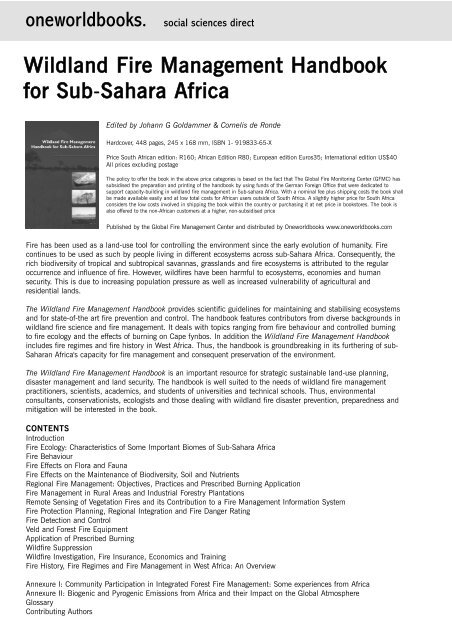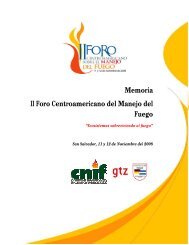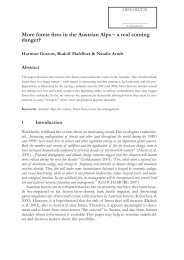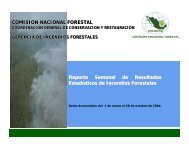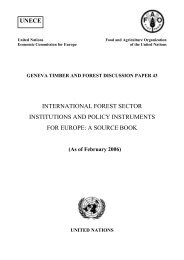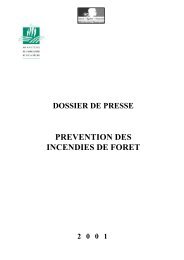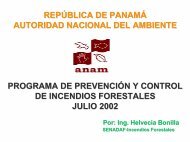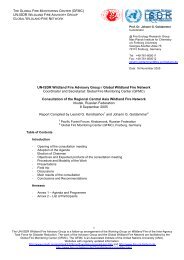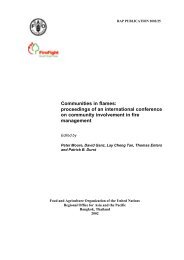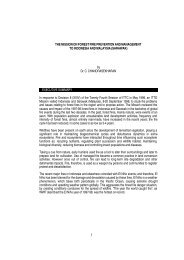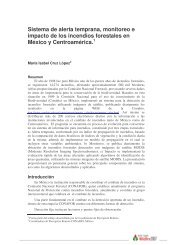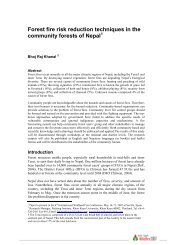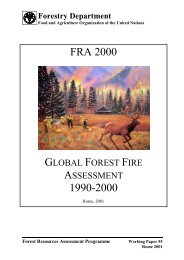Wildland Fire Management Handbook for Sub-Sahara Africa
Wildland Fire Management Handbook for Sub-Sahara Africa
Wildland Fire Management Handbook for Sub-Sahara Africa
Create successful ePaper yourself
Turn your PDF publications into a flip-book with our unique Google optimized e-Paper software.
oneworldbooks. social sciences direct<br />
<strong>Wildland</strong> <strong>Fire</strong> <strong>Management</strong> <strong>Handbook</strong><br />
<strong>for</strong> <strong>Sub</strong>-<strong>Sahara</strong> <strong>Africa</strong><br />
Edited by Johann G Goldammer & Cornelis de Ronde<br />
Hardcover, 448 pages, 245 x 168 mm, ISBN 1- 919833-65-X<br />
Price South <strong>Africa</strong>n edition: R160; <strong>Africa</strong>n Edition R80; European edition Euros35; International edition US$40<br />
All prices excluding postage<br />
The policy to offer the book in the above price categories is based on the fact that The Global <strong>Fire</strong> Monitoring Center (GFMC) has<br />
subsidised the preparation and printing of the handbook by using funds of the German Foreign Office that were dedicated to<br />
support capacity-building in wildland fire management in <strong>Sub</strong>-sahara <strong>Africa</strong>. With a nominal fee plus shipping costs the book shall<br />
be made available easily and at low total costs <strong>for</strong> <strong>Africa</strong>n users outside of South <strong>Africa</strong>. A slightly higher price <strong>for</strong> South <strong>Africa</strong><br />
considers the low costs involved in shipping the book within the country or purchasing it at net price in bookstores. The book is<br />
also offered to the non-<strong>Africa</strong>n customers at a higher, non-subsidised price<br />
Published by the Global <strong>Fire</strong> <strong>Management</strong> Center and distributed by Oneworldbooks www.oneworldbooks.com<br />
<strong>Fire</strong> has been used as a land-use tool <strong>for</strong> controlling the environment since the early evolution of humanity. <strong>Fire</strong><br />
continues to be used as such by people living in different ecosystems across sub-<strong>Sahara</strong> <strong>Africa</strong>. Consequently, the<br />
rich biodiversity of tropical and subtropical savannas, grasslands and fire ecosystems is attributed to the regular<br />
occurrence and influence of fire. However, wildfires have been harmful to ecosystems, economies and human<br />
security. This is due to increasing population pressure as well as increased vulnerability of agricultural and<br />
residential lands.<br />
The <strong>Wildland</strong> <strong>Fire</strong> <strong>Management</strong> <strong>Handbook</strong> provides scientific guidelines <strong>for</strong> maintaining and stabilising ecosystems<br />
and <strong>for</strong> state-of-the art fire prevention and control. The handbook features contributors from diverse backgrounds in<br />
wildland fire science and fire management. It deals with topics ranging from fire behaviour and controlled burning<br />
to fire ecology and the effects of burning on Cape fynbos. In addition the <strong>Wildland</strong> <strong>Fire</strong> <strong>Management</strong> <strong>Handbook</strong><br />
includes fire regimes and fire history in West <strong>Africa</strong>. Thus, the handbook is groundbreaking in its furthering of sub-<br />
<strong>Sahara</strong>n <strong>Africa</strong>'s capacity <strong>for</strong> fire management and consequent preservation of the environment.<br />
The <strong>Wildland</strong> <strong>Fire</strong> <strong>Management</strong> <strong>Handbook</strong> is an important resource <strong>for</strong> strategic sustainable land-use planning,<br />
disaster management and land security. The handbook is well suited to the needs of wildland fire management<br />
practitioners, scientists, academics, and students of universities and technical schools. Thus, environmental<br />
consultants, conservationists, ecologists and those dealing with wildland fire disaster prevention, preparedness and<br />
mitigation will be interested in the book.<br />
CONTENTS<br />
Introduction<br />
<strong>Fire</strong> Ecology: Characteristics of Some Important Biomes of <strong>Sub</strong>-<strong>Sahara</strong> <strong>Africa</strong><br />
<strong>Fire</strong> Behaviour<br />
<strong>Fire</strong> Effects on Flora and Fauna<br />
<strong>Fire</strong> Effects on the Maintenance of Biodiversity, Soil and Nutrients<br />
Regional <strong>Fire</strong> <strong>Management</strong>: Objectives, Practices and Prescribed Burning Application<br />
<strong>Fire</strong> <strong>Management</strong> in Rural Areas and Industrial Forestry Plantations<br />
Remote Sensing of Vegetation <strong>Fire</strong>s and its Contribution to a <strong>Fire</strong> <strong>Management</strong> In<strong>for</strong>mation System<br />
<strong>Fire</strong> Protection Planning, Regional Integration and <strong>Fire</strong> Danger Rating<br />
<strong>Fire</strong> Detection and Control<br />
Veld and Forest <strong>Fire</strong> Equipment<br />
Application of Prescribed Burning<br />
Wildfire Suppression<br />
Wildfire Investigation, <strong>Fire</strong> Insurance, Economics and Training<br />
<strong>Fire</strong> History, <strong>Fire</strong> Regimes and <strong>Fire</strong> <strong>Management</strong> in West <strong>Africa</strong>: An Overview<br />
Annexure I: Community Participation in Integrated Forest <strong>Fire</strong> <strong>Management</strong>: Some experiences from <strong>Africa</strong><br />
Annexure II: Biogenic and Pyrogenic Emissions from <strong>Africa</strong> and their Impact on the Global Atmosphere<br />
Glossary<br />
Contributing Authors
OTHER SELECTED TITLES FROM oneworldbooks.<br />
SOUTHERN AFRICAN JOURNAL OF ENVIRONMENTAL EDUCATION, VOLUME 20 (2003)<br />
Environmental Education, Ethics and Action: Policy-in-Practice<br />
Heila Lotz-Sisitka, Godwell Nhamo, Charles Obol, Rob O’Donoghue, Johann Hattingh (eds)<br />
240mm x 175mm | 160pp | ISBN: 1-919833-60-9 | R 240.00 | 2004<br />
Environmental policy development and implementation is a ‘hot topic’ in southern <strong>Africa</strong>, following global imperatives <strong>for</strong> countries around the world to<br />
articulate their intentions to become more sustainable through public policy. Papers in the journal reflect a broad spectrum of views on policy-inpractice,<br />
with contributions from South <strong>Africa</strong>, Swaziland, Zimbabwe, Zambia, Tanzania and Lesotho, as well as the USA, UK, India, Italy and Denmark.<br />
With a concern <strong>for</strong> democratic orientations to policy-in-practice processes, the contributions included go far towards illustrating how environmental and<br />
environmental education policy processes are intertwined.<br />
WILD LAW<br />
Cormac Cullinan<br />
198mm x 130mm | 264 pp | ISBN: 0-9584417-8-2 | R 180.00<br />
It is becoming clear that many of the treaties, laws and policies concluded in recent years have failed to slow down, let alone halt or reverse, the<br />
destruction of our habitat. Like Fritjof Capra, who argues that our survival requires a radically different social and economic structure, Cormac Cullinan<br />
shows that the survival of the community of life on Earth (including humans), requires us to alter fundamentally our understanding of the nature and<br />
purpose of law and governance, rather than merely changing laws. In describing what this new “Earth governance” and “Earth jurisprudence” might look<br />
like, he also gives practical guidance on how to begin moving towards it. Thomas Berry, the leading environmental philosopher, says ‘This book of<br />
Cormac Cullinan explains with great clarity how we can change our entire approach to governance so that we can continue life on a liveable planet. In<br />
its basic outlines this book is one of the finest contributions to the entire field of jurisprudence in recent times.’<br />
ORDERING INFORMATION<br />
SIngle-copy orders can be placed online at www.oneworldbooks.com.<br />
All other orders can be placed through Blue Weaver by fax at +27 21 701 7302 or e-mail on<br />
orders@blueweaver.co.za. Please include the following in<strong>for</strong>mation with your order:<br />
Name<br />
Organisation<br />
Delivery Address<br />
City Postal code Country<br />
Email address Telephone number<br />
ORDER DETAILS TOTAL<br />
<strong>Africa</strong>n Edition x ZAR 80.00<br />
South <strong>Africa</strong>n Edition x ZAR 160.00<br />
European Edition x EUR 35.00<br />
International Edition<br />
POSTAGE (registered airmail)<br />
x US$ 40.00<br />
South <strong>Africa</strong>: R35.00; Southern <strong>Africa</strong>: R100.00; Rest of the World: R150.00<br />
TOTAL<br />
Preferred method of payment method: G Direct transfer<br />
G Credit Card<br />
BANKING DETAILS:<br />
Blue Weaver Marketing & Distribution G Mastercard G Visa<br />
Standard Bank<br />
Blue Route Branch<br />
Branch Code: 025609<br />
Account Number: 270023054<br />
Card no. GGGG GGGG GGGG GGGG<br />
Expiry date GG GGGG CVC no. GGG (last 3 digits on back of card)<br />
Signature<br />
G Check this box if you do not wish to receive oneworldbooks email new book notifications<br />
www.oneworldbooks.com


